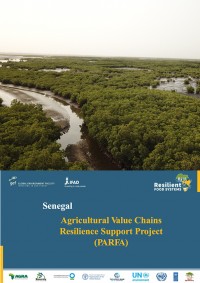Using and adapting the SHARP+ tool to assess the resilience of smallholder communities
03 November 2020
Project Name
Agricultural Value Chains Resilience Support Project (PARFA)
GEF Implementing Agency
IFAD, UNIDO
Objective
To improve smallholder agriculture and food value chains through prioritizing the safeguarding and maintenance of ecosystem services.
Project Targets
land under integrated and sustainable management
GHG emissions avoided or reduced
beneficiary households
Senegal’s agriculture and livestock sector makes up roughly 17% of GDP and employs 70% of the population. While total land area under production has remained relatively stable, Senegal has experienced rapid population growth, leading to an overcrowding on agricultural land, overexploitation of natural resources, land degradation, and deforestation. These drivers have resulted in poor provision of ecosystem services and lowered agricultural productivity. For Senegalese farmers who also experience poor access to credit, agricultural material, and equipment, these challenges translate to food insecurity, malnutrition, and unstable livelihoods.
Climate change has resulted in increasing mean annual temperatures, a reduction in annual rainfall, an increase in rainfall variability, and an increase in the frequency and severity of extreme climate events. Given high levels of land degradation and poor provision of ecosystem services, the agriculture and livestock sector is particularly vulnerable to climate change and climate variability. This, coupled with weak technological innovation, has resulted in the stagnation of agricultural yields.
Through the RFS Senegal project, the Agricultural Value Chains Resilience Support Project (PARFA), the Government of Senegal is promoting the sustainable improvement of family farms in the Groundnut Basin and silvo-pastoral regions.
In order to deliver global environmental benefits at scale, the project is structured around three principal components, all critical areas in the causal chain of environmental degradation:
The project is also working to establish a financial window for sustainable land and environmental management through the National Agro-Silvo-Pastoral Development Fund in order to secure funding for scaling up best practices.
Overall, the project is designed to benefit around 52,500 people in 5,250 households through technical support and training, improved monitoring and evaluation, and environmental measures including land rehabilitation and soil and water conservation.
The project aims to meet the following targets:
Multi-stakeholder platforms established that integrate environmental degradation issues and climate variability in development actions.
Resilience of smallholder farmers improved.
A mechanism for the monitoring and evaluation of environmental impacts and food security is established and functional.
At the national level, major stakeholders include the Ministry of Agriculture and Rural Equipment, Institute of Food Technology, Commission on Food Safety, Agronomists and Veterinarians Without Borders, National Institute of Pedology, Ecological Monitoring Centre, National Agricultural and Rural Advisory Agency, National Renewable Energy Agency and the Office for Rural Boreholes. Other major stakeholders include the National Agricultural Credit Fund of Senegal and service providers for agriculture and livestock farming.
Each RFS country project conducts activities that fall under common thematic areas within the programme. Explore each project theme relevant to the RFS Senegal country project below to see which activities are being implemented under each theme.
Stories from the Field
Explore our stories from the field to learn more about the activities, milestones, lessons learned, and achievements of the RFS Senegal project.
Relevant Resources
We have a growing library of reports, briefs, case studies, media, tools and guidelines. Explore all resources related to the RFS Senegal project to get greater insight into our programme activities.


The RFS Senegal project is working to improve smallholder agriculture and food value chains through prioritizing the safeguarding and maintenance of ecosystem services. RFS Senegal Project Coordinator, Ndèye Khady Fall, gave a webinar presentation to RFS country project teams in July 2020 to provide an update on country project activities, achievements, challenges and lessons learned. The presentation was followed by facilitated Q&A session to allow country project and RFS partners to exchange information and learn more about Senegal country project activities.


Implemented by IFAD and UNIDO, the objective of the RFS Senegal project, Agricultural Value Chains Resilience Support Project (PARFA), is to improve smallholder agriculture and food value chains through prioritizing the maintenance of ecosystem services. This brochure provides an overview of the project, outlining the challenges that are facing the growth of Senegal’s agricultural production and the project’s integrated approach to addressing these challenges through tailored interventions along agri-food value chains.


Implemented by IFAD and UNIDO, the objective of PARFA is to improve smallholder agriculture and food value chains through prioritizing the maintenance of ecosystem services. This factsheet provides an overview of the project, outlining the various components, stakeholders, and anticipated impacts, as well as key innovative elements within the project design and implementation.
The Knowledge Centre is a central platform for sharing resources and information generated by the 12 Resilient Food Systems country projects and Regional Hub.
Within the Knowledge Centre, you can find helpful resources, tools, case studies, and news stories related to the different countries and themes of the Resilient Food Systems programme.